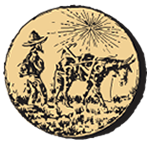Mining and Minerals Education Foundation |

Charles Meyer
(1915-1987)
2005 Inductee from Mining's Past
Born September 30, 1915, in St. Louis, Missouri, Charles Meyer was a mining geologist and a teacher. He entered Washington University in 1933 and graduated with a B.S. degree in Geology in1937 and an M.A. in 1939. He was awarded a graduate fellowship to Harvard University, where he studied the geology of metalliferous ores with L. C. Graton and Donald H. McLaughlin and received an M.A in 1940. He then moved to Butte, Montana, as a research geologist for the Anaconda Copper Mining Company, where his life-long career in the study of ore geology took roots. At Butte, Meyer established a geological research laboratory and came under the influence of Anaconda’s Chief Geologist, Reno H. Sales, with whom he commenced a detailed study of the mineralization in the district. The outgrowth of this study, probably the first of its kind that involved a thorough analysis of mineralogy and ore controls with laboratory support, was a detailing of the process of ore formation and its effect on wall rocks. The principles of alteration and its interpretation developed by Meyer more than 50 years ago have survived and become a worldwide basis of interpretation in ore search by generations of exploration geologists. Based on this work, he was awarded a Ph.D. by Harvard University in 1950.
After 12 productive years at Butte, Meyer joined the faculty of the University of California at Berkeley in 1953. He retired to Sedona, Arizona, in 1982, from where he maintained his academic interests as an Adjunct Professor at the University of Arizona. During his years at Berkeley, he worked with a group of brilliant students whose record of ore discovery and scientific contributions to the body of knowledge about ore forming processes is outstanding. He was a friendly and inspiring teacher and retained a continuing interest in geological research. Through this period, he retained a close connection with Anaconda and was a major contributor to the success of their exploration and development programs.
Charles Meyer was accorded numerous honors that included a Guggenheim Fellowship that he used to visit and study ore deposits in Africa, Europe, and Australia, and honorary lectureships at Harvard and in Australia. He was elected President of the Society of Economic Geologists and in 1982 he was awarded the “Penrose Gold Medal” by that Society. He remains best known for establishing the importance of basic science and laboratory studies to the problems of ore search. He had few peers in his field during the last half of the 20th Century and his fundamental contributions to the profession of geological exploration will endure.
Print Version Previous Archive Next
